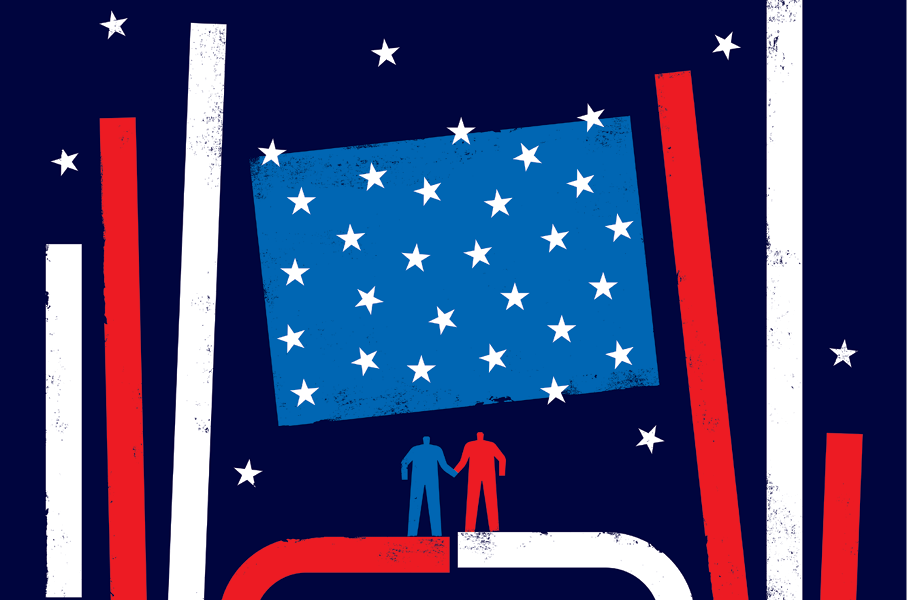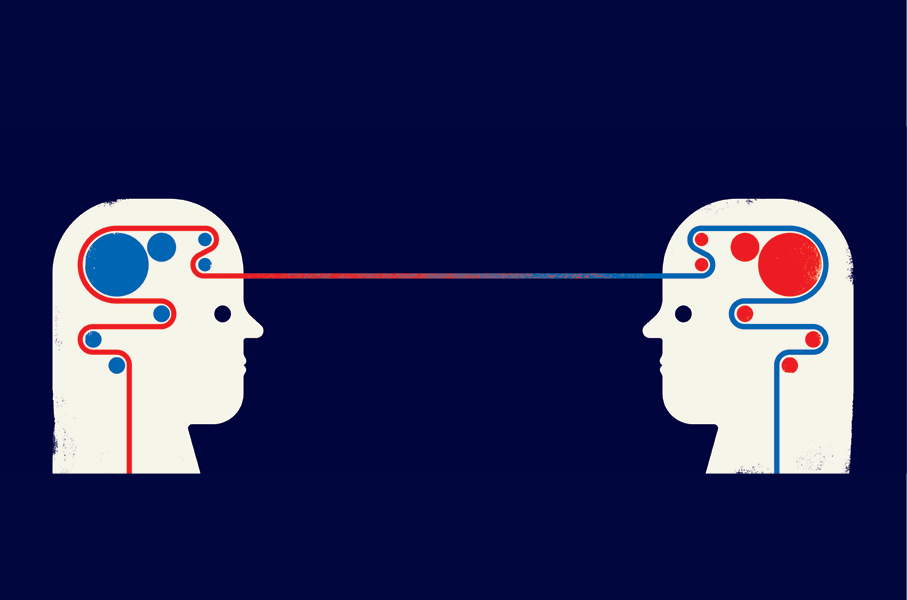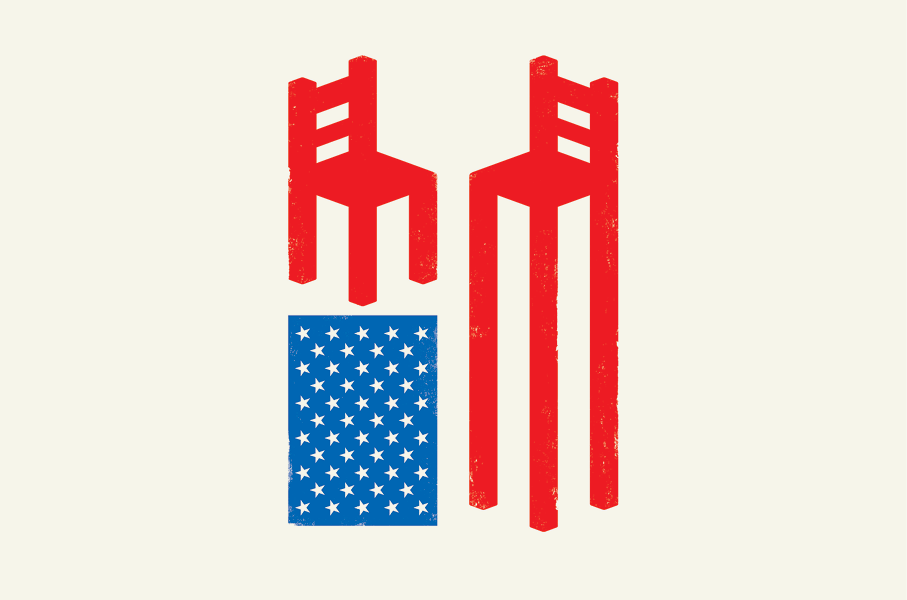In the polarized political climate of 2020, there are no easy choices about how—or even whether—to maintain relationships with people who disagree with your most cherished convictions. Recent polls, such as those from Reuters/Ipsos and the University of Minnesota, show a growing number of us have cut ties with a friend or family member over political differences.
Here, Och Tamale magazine speaks with three Bulldogs of different generations who have prioritized relationships over politics—and why and how they managed to do it.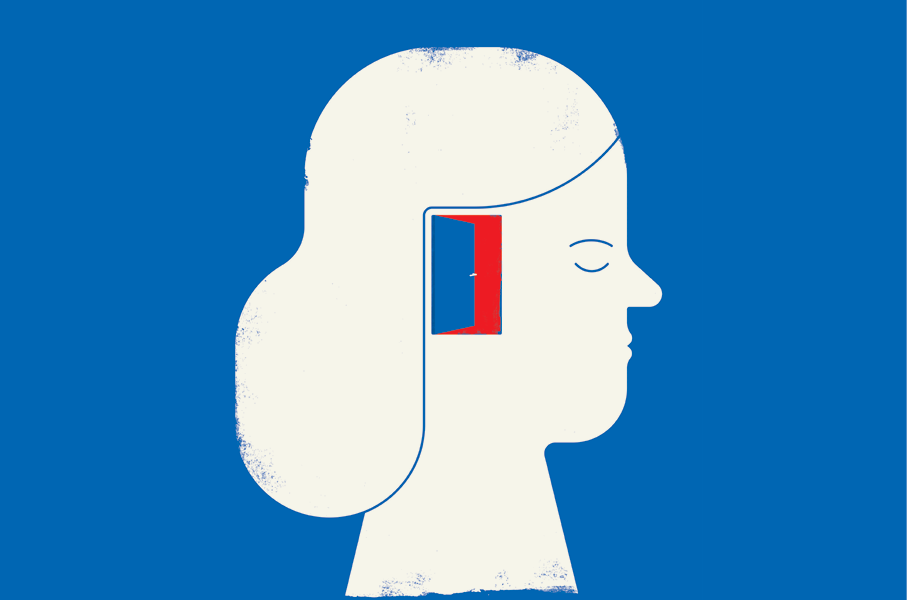
SALLY CUMMINGS '56: 'LISTEN, LISTEN, LISTEN'
As a student at the University of Redlands, Sally Cummings ’56 learned about perspective and planning on the athletic fields.
“I learned from my professor, Dr. Craig, who was wonderful about not just telling us what skills to use on the field, but how those skills applied to everyday life,” she says. “In my discussions and experiences, I now always think, ‘What do I do when the ball comes to me? How do I respond and take charge?’”
She maintained this mentality during her career as a physical education teacher and continues to employ it in conversations about politics and current events with her friends and family.
Equal footing
As the daughter of a Baptist pastor, she learned about the importance of tolerance and understanding while observing the racial prejudices that permeated many attitudes of the time. As a teenager, she moved to Southern California from the East Coast; meeting new friends allowed her to expand her horizons.
During attendance at an aquatic school in Arizona before her senior year in college in 1955, Cummings remembers noticing that one of the Black participants was absent during a group outing. She asked after him and found: “He wasn’t allowed to swim in the pool.”
U of R continued to shape Cummings’ worldview in myriad ways. Discussions in and out of the classroom with friends and professors helped her cultivate her keen observation of the world and an understanding that “we’re not all the same.” She carried the skills she learned, both intellectual and interpersonal, into her career as an educator.
“I came to believe strongly in the worth of an individual,” she says, “and that communities should be cared for in an equal way.”
Strengthening ties
Now retired, Cummings spends much of her time these days checking in with friends and relatives and listening to their perspectives, which range across the political spectrum. Recent conversations with her grandchildren have covered topics from protest to white privilege.

“My children, stepchildren, grandchildren, most of my relatives, and friends know exactly where I stand,” she says. “Many of them allow me to express that when it’s appropriate; many of them don’t, because it would probably entail a much heavier and controversial discussion than either one of us would want to take on.”
Realizing that these discussions reflect her family members’ lived experiences, Cummings feels proud of the decisions she made that helped her children broaden their worldviews. “I think that [attending elementary and middle schools with a diverse student population] was one of the greatest gifts they received,” she says. “They continue to keep in touch with friends from that period and were extraordinarily comfortable in high school and college.”
Cummings’ daughter, Leslie Best ’88, elaborates. “I went to one of the most impoverished schools in the district, and that exposed me to a lot—for example, kids who came to school without having had a meal. It eventually influenced my professional choices in terms of becoming a counselor and working in mental health.”
Moving forward
On the occasion a conflict arises in a conversation with a friend or family member, Cummings says she leans toward being nonjudgmental by valuing others’ opinions even though she might disagree with them.
“I tend to do more listening than I do talking,” she says, noting that she prefers face-to-face or telephone conversations, rather than speaking via text or social media platforms.
Like her mother, Best considers the importance of her relationships with friends and says that mutual respect is paramount to resolve conflict. “I often think about whether or not a relationship is strong enough to allow for us to engage in meaningful conversation in a caring way,” she says.
Cummings continues to broaden her understanding of others by belonging to groups that challenge her thinking. As a member of three committees at her church dedicated to social, environmental, and racial justice, these days she meets virtually with members of her congregation to talk about issues and initiatives that engage the community in conversation.
“It’s important for people to be unafraid of being in a space where everybody isn’t like you,” she says. “It challenges how you think. Get in a group where you can absorb new and meaningful ideas, and challenge the ones that don’t work.”
Offering advice for maintaining peace in these divisive times, Cummings harkens back to what she learned about perspective. “Listen, listen, listen,” she says. “I often use the phrase ‘Well, have you thought about it this way?’”
“I tend to do more listening than I do talking.”
— Sally Cummings ’56
KEVIN RUNBECK '79: HONORING OTHERS' TRUTHS
Runbeck Elections Services Inc. sits behind Arizona’s Phoenix Sky Harbor International Airport. For years, its president and CEO, Kevin Runbeck ’79, has looked out his office window to see airplanes taking off and landing—hundreds, maybe thousands. Lately? Not as many.
Voting in a pandemic
The COVID-19 pandemic has meant people haven’t been traveling, and airports have stopped bustling. Runbeck has seen first-hand other ways that COVID-19 is changing America as well.
As its name suggests, Runbeck Elections Services is a full-service election printing, equipment, and software company serving more than 20 states and a third of the country’s electorate. Runbeck’s father founded the company as a boutique advertising agency in 1972. In 1988, Runbeck purchased it; what started with seven employees now encompasses two buildings occupying 140,000 square feet, with almost 400 employees and a digital printing facility. If you’ve voted in California, Arizona, Washington, or Oregon, chances are your ballot was printed, mailed, or somehow verified by Runbeck’s firm.
Public health concerns have fueled interest in voting by mail, and Runbeck notes a lot of noise—allegations and conspiracy theories—now surround how trustworthy the process is. Runbeck is first to dispute the potential of widespread fraud because he knows precisely how meticulous the process is. Ballots are checked by the same systems that banks use to verify signatures on checks. Both electronic and human eyes verify them. If anything looks forged, the ballot gets kicked out, and the voter gets called for questioning and, in some cases,
is prosecuted.
“It’s possible to change a few ballots here or there, but I have serious doubts that any entity could change ballots in a volume necessary to impact the election,” Runbeck says. “There’s just no way that someone could commit that level of fraud and not be caught.”
The Redlands connection
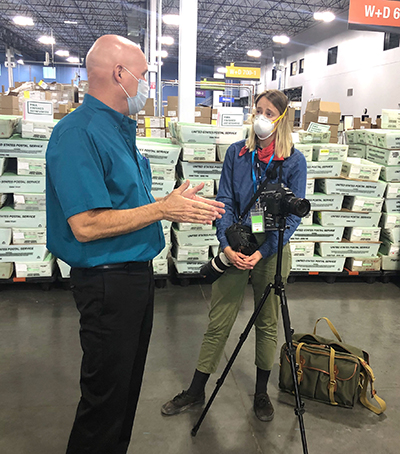
Runbeck originally dreamt of being an oceanographer; he came to Redlands on a lark. After spending a weekend on campus during an orientation program, “I just knew I was home.” By his own account, he wasn’t the best student, but graduated from Redlands with an outlook that served him well.
“I am a classic entrepreneur, so I’m undaunted by failure,” he says. “The bottom line is you only have to succeed one more time than you fail, and you’re a hero. I took my less-than-stellar performance at Redlands as just an opportunity to apply myself better in the future.”
Runbeck’s pledge brothers from Chi Sigma Chi, whom he met at Redlands 40 years ago, are still some of his closest friends. He credits Redlands with helping him build and maintain incredible connections and teaching him to be comfortable dialoguing with people of different beliefs.
A ‘politics-free zone’
Runbeck says his company is a “politics-free zone,” despite (and because of) the work they do. “Our mission is to defend democracy, and we do that by ensuring an accurate tabulation that represents what the voters wanted,” he says. “Our job has nothing to do with who’s running or how we feel; it is to make sure voters who are entitled to vote got a ballot, and the person who got the most votes is elected. That’s it.”
Still, he requires each of his full-time employees to read the book Leadership and Self-Deception: Getting out of the Box by The Arbinger Institute—and takes time to discuss it with each of them. “It’s a two-hour conversation, and I have 180 [full-time] employees!” Runbeck says he holds four to five discussions a week in his office.
Brandon Johnson joined Runbeck Election Services as a solutions consultant in April. At their one-on-one conversation, Runbeck explained the rationale behind the reading requirement: “Kevin said that we all come from different worlds, from diverse backgrounds, and sometimes even speak different languages. Having everyone read this book creates that one common topic [at work] that we can all discuss first,” says Johnson. “It’s great to have a CEO so focused on making the business grow from a company-culture perspective, rather than just focusing on the bottom line.”
In addition, Runbeck wants all his employees to bring Leadership and Self-Deception’s key message to work with them: Whether speaking with family members, friends, or employees, it’s essential to recognize that the other person’s truth is just as valuable as your own.
“Afterward, we can debate on the best compromise so we can advance both our truths,” Runbeck says. “My mother, for example, is 92 and to the right of me, and we’ll have these lively debates. My children are generally more liberal than
I am, and they’ll go the other way. You have to honor the fact they believe what they believe.”
“You have to honor the fact they believe what they believe.”
—Kevin Runbeck ’79
JOE RICHARDSON '93: MEETING PEOPLE WHERE THEY ARE
For Joe Richardson ’93, the University of Redlands served as a place to explore his interests in government, political science, and law. Years later and now a practicing attorney, his curiosity remains and has led him to launch a podcast where he speaks with local and nationwide experts on such topics.
Equally passionate about civic life and public speaking, Richardson now merges the two with his Joe Speak! podcast, which has addressed timely issues such as COVID-19, policing, and student wellness. “I’ve always wanted the opportunity to talk to people who are experts in their field and inform an audience without politicizing the issues,” he says.
A people person
Growing up in South Central Los Angeles, Richardson learned about politics by having conversations with his father at a local cafe over breakfast. At the time, Los Angeles was under the helm of Tom Bradley, the city’s first Black mayor, who would become one of Richardson’s heroes. He began familiarizing himself with local political figures, many of whom came from careers in the legal field.
“I saw that being a lawyer would be a chance to help people,” he says.
As a first-year student at Redlands, Richardson used his interest in stand-up comedy to form bonds with fellow students, which helped him get elected as president of the Associated Students of the University of Redlands (ASUR) as a sophomore (he served in his junior year). In that role, he created the Greek Council, a committee that oversees Greek social organizations’ self-governance.
“How you see things depends on where you sit.” —Joe Richardson ’93
Learning to listen
When Los Angeles erupted in civil unrest following the Rodney King verdict, Richardson saw an opportunity to facilitate meaningful conversations around race on campus.

“The civil unrest took place during the last two days of my presidency,” he says. “I had a lot of very important conversations on campus with [then-president] Dr. James R. Appleton and other folks. Seeing peoples’ willingness to be vulnerable and honest about how they’re feeling meant a lot to me. I’m still friends with some of my classmates who come from very different backgrounds, and we still have those kinds of conversations that started all that time ago.”
In addition to being a practicing attorney and podcast host, Richardson regularly publishes articles and speaks to audiences of college students across the country. He says his student government experiences taught him how to relate to others and paved the way for his career.
“Change happens when you’re able to have conversations with people that you have relational influence with,” he says. “At Redlands, I learned how to listen and talk to people to validate and help them.”
Understanding each other
Greg Lewis ’94, a former U of R assistant basketball coach, says that meeting Richardson and maintaining their friendship has led the two to discuss a range of issues. “Joe is the same person today as he has always been—he’s just a genuinely nice and authentic guy,” says Lewis. “The conversations we had when we were in college have helped us to stay connected and have given us a platform to impact the communities we live in.”
Just as he encouraged his classmates to adopt new perspectives during his tenure as ASUR president, Richardson hopes that the conversations he has on his podcast will stir his listeners’ thoughts. More often than not, he says, he focuses less on his guests’ political stances and more on their expertise, leaving listeners to form their own conclusions.
Richardson approaches these conversations with his audience in mind, attempting to meet people where they are regardless of whether he’s speaking to family members, guests on the podcast, or people in his professional life. While he recognizes that these are incredibly polarizing times, Richardson believes in the power of reconciliation that allows people to understand each other.
“How you see things depends on where you sit,” he says, offering advice for traversing tumultuous conversational waters. “If we understand that another person has a different point of view, that view is informed by what they’ve been through. Start with your common humanity and see where it goes.”
Learn more about the University of Redlands or explore the Fall 2020 issue of Och Tamale magazine.

